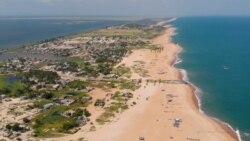The United States is partnering with Ghana and countries across Africa to address the major challenges of our time, including climate change, biodiversity, and pollution. “We are working together to protect the ocean and the environment – for the benefit of all people all over the world,” said Jennifer Littlejohn, Acting Assistant Secretary for Oceans and International Environmental and Scientific Affairs. “Ghana is a great example of environmental ambition.”
“Ghana’s commitment to forest conservation is translating into tangible outcomes, with initiatives like the LEAF Coalition and Forest Carbon Partnership Facility, a coalition of 32 governments working to halt and reverse deforestation by 2030.”
The United States and Ghana co-chair the Forest and Climate Leaders’ Partnership, a global coalition working to stop and reverse forest loss and land degradation. The United States is also a partner in the “Resilient Ghana” country package, which supports Ghana’s ambitious efforts to halt deforestation and restore degraded lands, said Acting Assistant Secretary Littlejohn.
And we are helping to expand Ghanaians’ access to environmentally friendly energy.
“The U.S. Agency for International Development is supporting access to clean energy in Ghana through initiatives like supporting small holder farmers to install solar-powered irrigation,” she said. “In addition, USAID provided technical assistance to the Bui Power hydro-solar plant. The plant, the first of its kind in West Africa, will put Ghana on track to cut its power sector greenhouse gas emissions by 235,000 tons per year.”
“These are groundbreaking moves,” said Acting Assistant Secretary Littlejohn.
Furthermore, the United States and Ghana collaborate to address health risks created by mercury use in artisanal small-scale gold mining. “Similar projects are in motion in Mali, the DRC, Guinea, Senegal, and Burkina Faso – a collaborative effort that’s evolving and adapting,” she said.
Finally, the United States works with experts at the University of Ghana on air quality projects.
“Other countries across Africa are taking similar steps to protect nature and the health and livelihoods of all the people who depend on it,” said Acting Assistant Secretary Littlejohn.
“We have made a lot of progress by working collaboratively. We are already making a difference, but we have so much work to do,” she said.
“The United States will continue to be a steadfast partner to countries across Africa on environmental and scientific issues. And of course, as President Biden said at the U.S.-Africa Leaders Summit, “the United States is all in on Africa and all in with Africa.”














